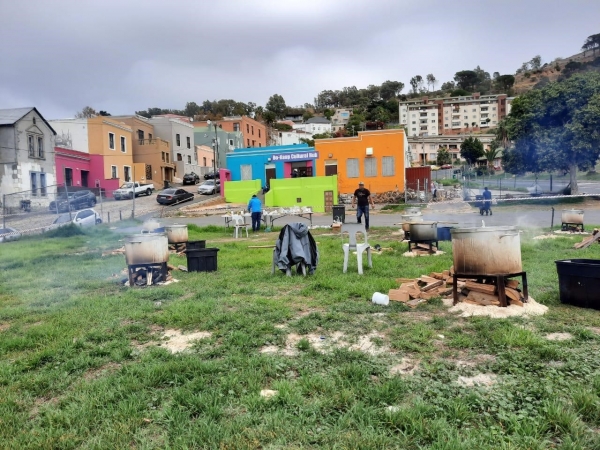Bo-Kaap community response to COVID-19: Living culture and tradition
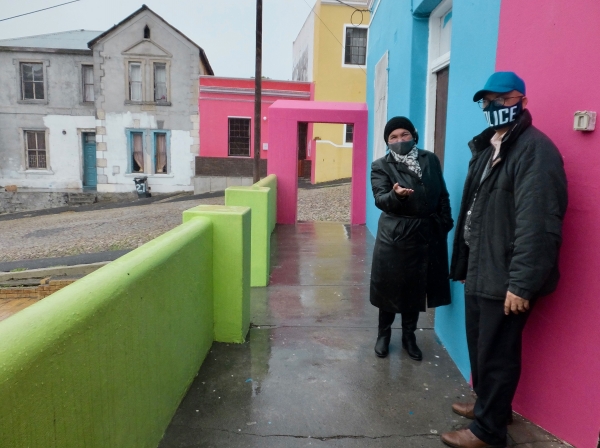
Mastuurah Adams, the lead coordinator of the Bo-Kaap COVID-19 Community Response Team stands outside the Bo-Kaap Cultural Hub with Cape Town Central police spokesperson, Captain Ezra October. October, who is well known in the community, says that the Bo-Kaap's soup kitchen has helped to feed many empty stomachs. "They even assisted the cops with lunch. While they're working, nobody thinks about it, but they thought about it - give the guy something to eat." Photo: Andrea Teagle
A week before the nationwide lockdown commenced, Bo-Kaap announced its closure to tourists. The neighbourhood with its colourful houses and rich history is located right behind the HSRC’s Cape Town office. Over the coming months, the Bo-Kaap COVID-19 Community Response Team - a group of young activists and community leaders - would provide humanitarian assistance, educational tools, religious guidance and virus screening to residents. Strong community ties and the adaptivity of Bo-Kaap’s religious and cultural traditions proved critical to the efficiency of the response. By Andrea Teagle and Rachel Adams
The Islamic athaan, or call to prayer, rang out through the cobbled streets of Bo-Kaap one quiet March afternoon - as it had five times a day, every day for as long as the residents of Bo-Kaap could remember. Yet something had changed.
The melodic chant that Ghaamien Najaar, the muezzin at Nurul Huda (Leeuwen Street) Mosque, knows as well as his own breathing had changed its words. Instead of calling those of faith to “Come [to mosque] and pray”, Najaar instead sang “al-Salaatu fee buyootikum” — pray in your homes. This adjustment was in accordance with the declaration by the Muslim Judicial Council following the
World Health Organization’s confirmation of COVID-19 as a global pandemic.
Throughout lockdown, the new athaan was sung from the 11 mosques of the wider Bo-Kaap area, and families heeded the call to pray at home.
Community response
The Bo-Kaap community has met many challenges during its almost 250 years of existence. The survival of its culture and traditions has, rather paradoxically, relied on adaptation and innovation.
Once “huurhuisjes” (rental houses) built for freed slaves and political exiles, Bo-Kaap’s iconic architecture became an expression of liberation when the inhabitants - from other African countries, Indonesia, Ceylon, Java and elsewhere - transformed them with brightly coloured paint after the abolition of slavery in 1834. The written Quran arrived in Bo-Kaap with Muslim leader and struggle icon Tuan Guru, a prince from the Ternate Island of Indonesia, who penned it from memory during a 13-year imprisonment on Robben Island. After his release in 1780, Guru settled in Bo-Kaap and helped establish the first Islamic school. Before the Auwal Mosque was built in 1790, the community made use of a workshop on the same site for prayer.
During apartheid, Bo-Kaap community organisations like the Boorhaanol Islam Movement gave young residents a chance to learn trades and secure employment, despite systemic discrimination against people of colour.
Today, despite the corrosive threat of gentrification, Bo-Kaap families remain connected by the mosques, community activities and multiple WhatsApp groups. These relationships were instrumental to arguably one of the quickest community responses to COVID-19 in Cape Town.
Masturah Adams, lead coordinator of the Bo-Kaap COVID-19 Community Response Team, says open communication about the first COVID-19 case was important to strengthen solidarity and mitigate stigma. “At that point in time, people were anxious: they didn’t know what to expect. All they knew was, there was a COVID-19 virus, people would die ... there would be no food on the table,” Adams recalled. As soon as people heard about the Response Team formed days before the national lockdown, they started reaching out.
Awareness of COVID-19 and the importance of protective measures quickly spread through the community channels. The Response Team worked with representatives from the Department of Health to develop an awareness programme and community testing centre. All households were screened for COVID-19. Bo-Kaap’s Ramadan soup kitchen was also expanded to reach more residents and assist nearby homeless populations.
“For the preservation of life, you have to take precautions,” said Sheikh Dr Darwood Terblanche of Leeuwen Street Mosque. “Like the Prophet has taught us, you have to tie your camel, and then you place your trust in the Almighty. Don’t just place your trust in the Almighty, leave your camel loose and then expect the camel to be there.”
Young residents also volunteered to assist the vulnerable with grocery shopping. Adams recalled how one woman called the team to request birdfeed and potatoes on behalf of her elderly parents. The old couple had said, “If you can’t get potatoes, that’s fine, but we need the birdfeed”. Thanks to the volunteers the couple were able to maintain their ritual of feeding the area’s iconic seagulls and pigeons, which wheel above the streets in the quiet of lockdown.
Living faith
During Ramadan, residents traditionally pray in the mosque each evening after breaking fast, known as Tarawih. In Islam, the good practice set by the Prophet Mohamed is to pray together, shoulder to shoulder, moving in the direction of the Kaaba in Mecca. Just as Christians share from the cup of the blood of Christ, Islam too is a faith of the body in communion with other bodies as much as it is a belief of the mind and soul.
Usually, those who have memorised the Quran would lead the community in evening prayers, but with the protocols of social distancing, these prayers were instead broadcast over the loudspeakers of the mosque. The effect was that the whole community could participate in the Tarawih prayers; before the pandemic, they had often been observed only by those without responsibilities at home who could attend the mosque.
“During the live recitals,” Terblanche explained, “we had youngsters and also the older generations who would sit on their porches and actually follow the recital in their own Quran, kind of a new tradition in the making. For us, it’s about a living culture and tradition.”
To keep the Jumu’ah prayer on Fridays alive, Terblanche and Bo-Kaap’s other religious leaders turned to social media, with the 11 mosques in the area taking turns to release video clips before 13h00 each Friday.
Dealing with death
Then came the first death during the pandemic. “It has been very sad for the community and also the family because, if a person tests positive and dies in a hospital, their body cannot come home for a traditional washing,” Terblanche said. The family traditionally washes the body of the deceased within 24 hours, in a symbolic ritual preparing them to face God.
With guidance from the medical fraternity, those trained according to the Islamic faith to perform the washing — known as toekamanies — were permitted to do so, but were required to wear full protective gear. As the first death of a Muslim person in the Western Cape from COVID-19, it set the precedent for how Islamic death rites were to be followed during the pandemic.
The whole neighbourhood would traditionally attend a funeral to pray for the safe passage of the soul of the deceased to Jannah (heaven). “We had to adapt our tradition,” Terblanche explained, and instead “there was a special prayer that we recited over the loudspeakers.”
Although the usual rituals could not be followed, Terblanche said that faith still gave the Bo-Kaap community solace as another two people died from the virus. Each time, their names were called and a prayer was recited over the mosque loudspeakers.
“When we have loss, we turn to our religion for that serenity ... and to make sense of it. Because we believe that everything happens with a divine will of the Almighty. So [there’s] a natural acceptance. It’s a grieving process, but it’s a natural process.”
Authors: Andrea Teagle, a science writer, and Dr Rachel Adams, a senior research specialist, in the HSRC’s Impact Centre
ateagle@hsrc.ac.za
radams@hsrc.ac.za
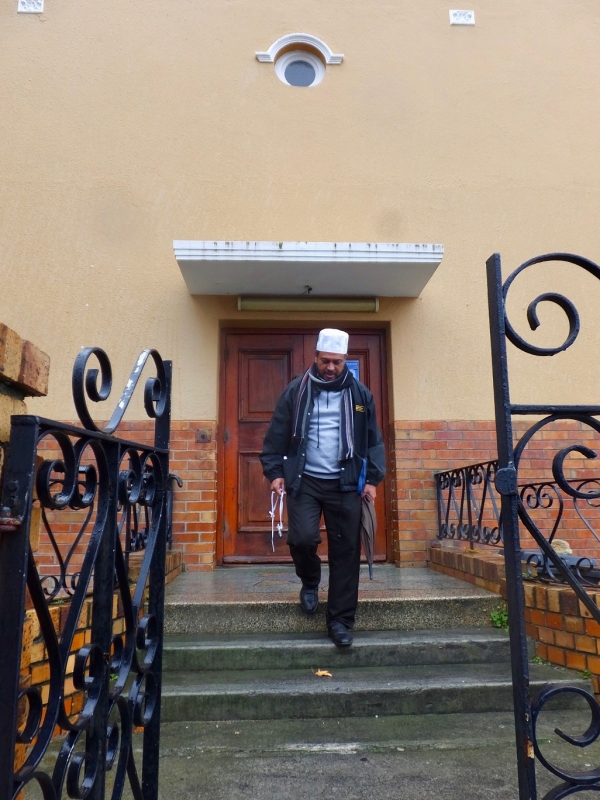
Sheikh Dr Darwood Terblanche walks out of Nurul Huda (Leeuwen Street) Mosque on a wet May afternoon during lockdown, after bidding farewell to the resident muezzin, Ghaamien Najaar, whose melodic voice fills the quiet mosque with an altered call to prayer five times a day.
Photo: Andrea Teagle
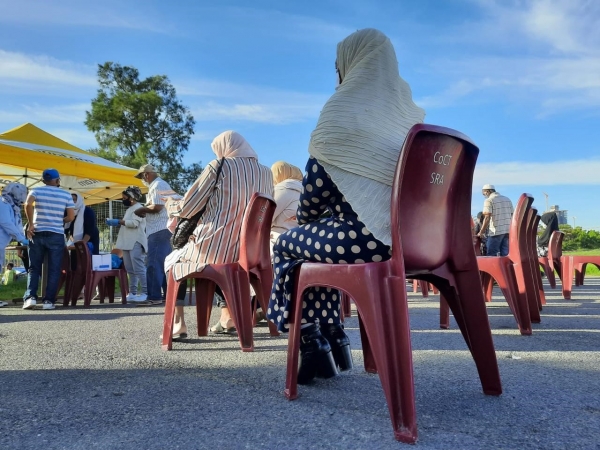
Grocery parcels donated by Gift of the Givers are handed out during Ramadaan in May 2020
Photo: Ebrahiem Christians
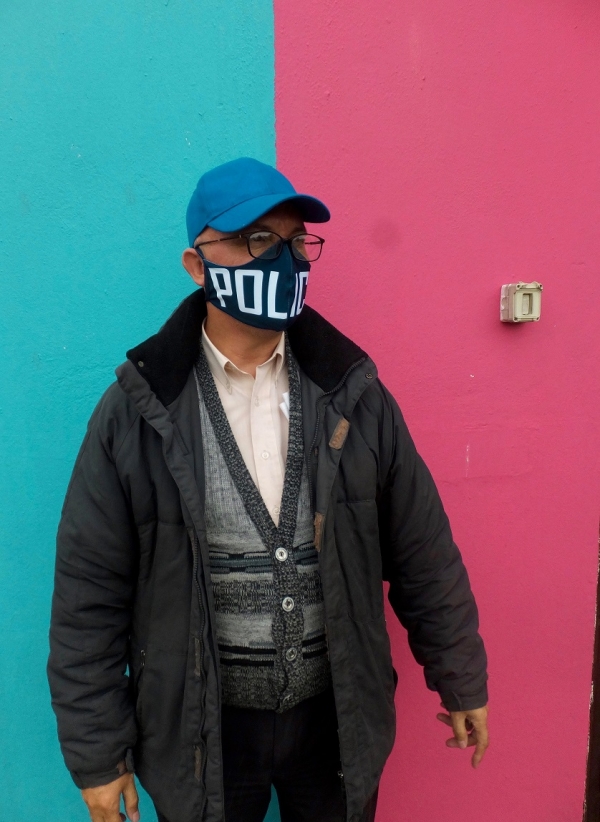
Cape Town Central police spokesperson, Captain Ezra October stands outside the Bo-Kaap Cultural Hub. October, who is well known in the community, says that the Bo-Kaap's soup kitchen has helped to feed many empty stomachs, from Bo-Kaap to the outskirts of the Cape Flats. "They even assisted the cops with lunch. While they're working, nobody thinks about it, but they thought about it - give the guy something to eat."
Photo: Andrea Teagle
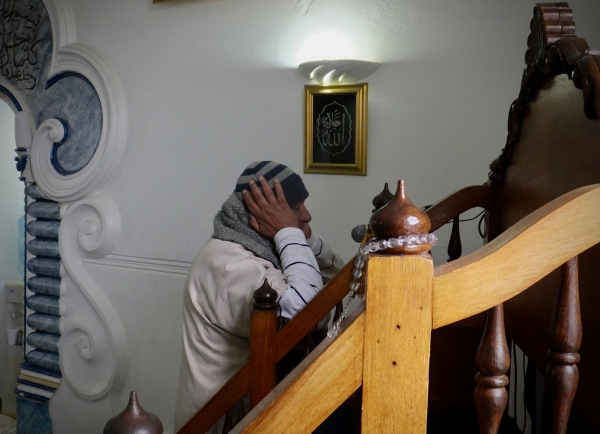
Ghaamien Najaar, the muezzin at Nurul Huda (Leeuwen Street) Mosque demonstrates how he sings the call to prayer in Bo-Kaap, Cape Town. Since lockdown, the Bo-Kaap community has heeded the call to pray at home.
Photo: Ebrahiem Christians

